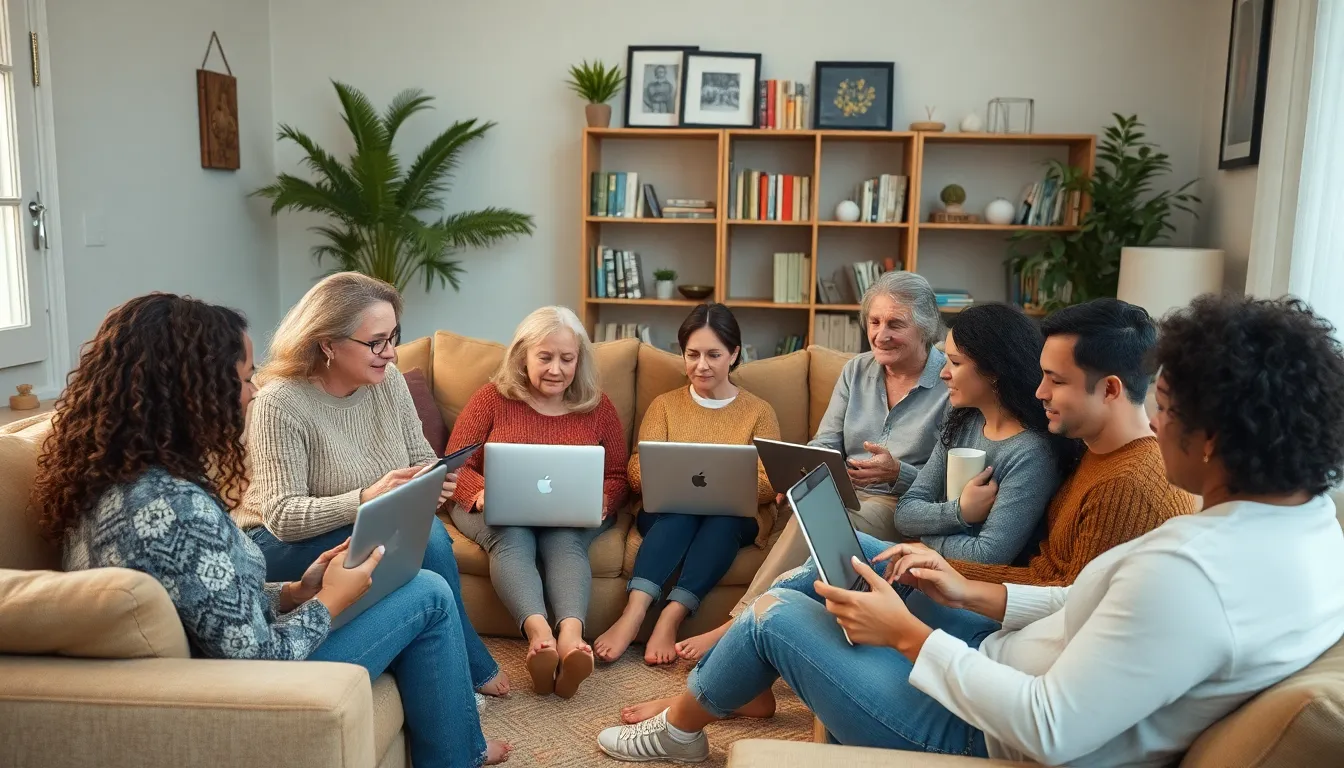Table of Contents
ToggleIn a world where social media connects us more than ever, online support groups are emerging as the unsung heroes of mental health. Imagine a cozy virtual corner where people gather to share their struggles, triumphs, and the occasional meme that perfectly sums up their day. These groups offer a safe space to connect with others who truly get it, all from the comfort of home—pajamas optional but highly encouraged.
Whether it’s battling anxiety, coping with grief, or navigating life’s curveballs, online support groups provide a sense of community that can be hard to find elsewhere. They break down barriers and prove that sometimes, a little humor and shared experience can be the best medicine. So grab your favorite snack, log in, and discover how these digital gatherings can transform your journey into a more uplifting experience.
Overview of Online Support Groups
Online support groups play a crucial role in mental health care by providing accessible platforms for individuals to connect. These groups offer a welcoming environment where participants share their experiences, fostering community and understanding. Individuals facing challenges such as anxiety, depression, or grief engage openly, often finding comfort in shared stories.
Various formats exist for online support groups, including forums, live chats, and video calls. Structure varies, with some groups moderated by professionals and others led by peers. Members benefit from real-time feedback and the opportunity to form meaningful connections without geographical limitations.
Safety and confidentiality are essential in these groups. Guidelines are typically established to promote respectful dialogue and protect personal information. Participants often report feeling less isolated, as the shared experience creates a sense of belonging.
Research indicates that the sense of community found in online support groups can lead to improved mental well-being. Emotional support and encouragement from peers contribute positively to coping strategies. Individuals frequently discover new perspectives on their struggles, enhancing their journeys toward healing.
Moreover, the convenience of joining from home removes barriers to accessing support. Some platforms specialize in specific issues, ensuring tailored interactions. Flexibility allows participants to connect at their convenience, making it easier to prioritize their mental health.
Online support groups represent a vital resource in contemporary mental health care, offering diverse benefits and promoting a sense of community among individuals sharing similar challenges.
Benefits of Online Support Groups

Online support groups offer numerous advantages that contribute significantly to mental health management. These groups enhance emotional well-being through community connection and shared experiences.
Accessibility and Convenience
Accessibility stands out as a major benefit. Participants can join groups from the comfort of their homes, eliminating geographic barriers. This convenience allows individuals to connect whenever they want, accommodating schedules without disrupting daily routines. Many platforms offer flexible formats, including forums and video calls. Groups are available at varying times, catering to different time zones and personal preferences. Busy individuals find it easier to participate, enhancing engagement and connection.
Anonymity and Comfort
Anonymity provides a safe space for sharing. Individuals often feel more comfortable discussing sensitive topics without revealing their identities. This confidentiality encourages open dialogue and honest expression, fostering deeper connections among members. Comfort levels increase when discussing personal challenges, as participants can choose how much to share. Many find that the online environment reduces social anxiety during discussions. The ability to interact discreetly empowers individuals to seek support freely, enhancing their mental health journey.
Types of Online Support Groups
Online support groups come in various formats to meet the diverse needs of participants. Most groups focus on peer support or professional-led guidance, creating options for individuals seeking help.
Peer Support Groups
Peer support groups consist of individuals sharing similar experiences. Members offer emotional support and understanding, fostering an atmosphere of acceptance. These groups often address issues such as addiction, anxiety, or grief. Participants connect through shared stories, which encourages healing and resilience. In a peer group, the absence of a therapist promotes relatability, making conversations feel less intimidating. Finding comfort in shared struggles often leads to stronger connections among members, enhancing the overall experience.
Professional-Led Support Groups
Professional-led support groups include trained facilitators guiding discussions. These professionals often possess expertise in areas like mental health, addiction, or trauma recovery. Having a knowledgeable leader improves the safety and structure of the group. Participants benefit from evidence-based strategies shared by these professionals, which can strengthen coping skills. The structured environment encourages open dialogue while maintaining focus on specific goals. Many individuals find greater comfort discussing their issues with trained professionals, enhancing the effectiveness of the support they receive.
Effectiveness of Online Support Groups
Online support groups contribute significantly to mental health improvement through shared experiences and emotional support. Members often find comfort in connecting with others facing similar challenges.
Research Findings
Numerous studies underscore the benefits of online support groups. A 2020 study found that participants experienced a 30% reduction in symptoms of anxiety after participating in these groups. Emotional support plays a crucial role, enhancing coping strategies and fostering resilience among users. According to the Journal of Medical Internet Research, over 80% of participants reported feeling less isolated and more understood after engaging in online discussions. Additionally, researchers confirm that anonymity often leads to a greater willingness to share personal experiences, promoting deeper connections.
Personal Testimonials
Many individuals share transformative experiences from online support groups. One participant noted, “Joining the group helped me feel less alone in my struggles.” Another member expressed, “I found friends who understand my journey.” These testimonials highlight how participants often gain not just support but also lasting friendships. Many describe feeling empowered by the shared wisdom of others, leading to newfound coping mechanisms. Another participant remarked, “I can open up without fear of judgment.” Such sentiments reflect the profound impact these virtual communities have on individual well-being.
Challenges of Online Support Groups
Online support groups face several challenges that can hinder their effectiveness. While they provide valuable resources, some inherent limitations must be acknowledged.
Lack of Personal Interaction
Without face-to-face communication, online support groups may lack the emotional depth found in in-person meetings. Participants miss out on nonverbal cues such as body language and eye contact, which enhance understanding and connection. Many individuals experience feelings of isolation, even while engaging virtually. This absence can impact the formation of deeper relationships among members. Furthermore, newcomers might find it difficult to connect in a purely digital environment. Establishing trust within a screen-based setting often takes longer than in person. The potential for misunderstanding is higher, which can lead to miscommunication.
Variability in Group Quality
Not all online support groups maintain the same level of quality or effectiveness. Variations exist in guidance, structure, and member engagement across different groups. Some lack consistent facilitation, resulting in chaotic discussions that may not benefit participants. Others may focus excessively on specific topics, limiting broader support. Furthermore, differences in group dynamics can impact the overall experience. Well-moderated groups tend to provide a supportive atmosphere, while poorly managed ones can lead to toxic interactions. Having access to reliable resources and experienced facilitators makes a significant difference in the effectiveness of these groups.
Online support groups have become essential in fostering mental health and well-being. They offer individuals a unique opportunity to connect with others who understand their struggles. The convenience and accessibility of these groups make them invaluable resources in today’s fast-paced world.
While challenges exist such as the lack of personal interaction and variability in group quality, the benefits often outweigh these drawbacks. Many participants find empowerment and a sense of belonging through shared experiences. As more people turn to these digital communities, the positive impact on mental health continues to grow. Engaging in online support groups could be a transformative step towards healing and connection.



